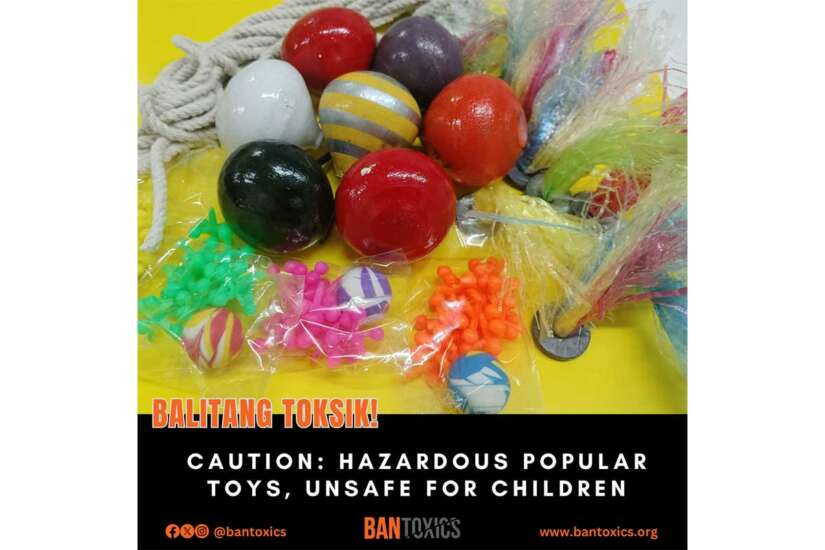Toxic watchdog group BAN Toxics has raised concerns about the safety of certain popular toys commonly used during the summer season, such as turumpo, sipa and jackstone, citing potential health risks to children.
In an effort to promote the campaign for safe toys, the group purchased and monitored the sale and composition of these popular toys. The group analyzed each toy for different hazards and screened for toxic chemicals metals using a Vanta handheld X-Ray Fluorescence (XRF) analyzer.
The painted turumpo, made from wood, were found to be free from lead, however, their sharp nails and long strings pose safety hazards. Similarly, jackstones, made from colored plastic with a rubber ball, were free from toxic chemicals but were identified as choking hazards. Alarmingly, sipa, made from a hard metal washer with plastic strings, was found to contain high levels of lead, with concentrations reaching 100,000 parts per million.
None of these toys were found to have the necessary labeling information, a direct violation of the Toy and Game Safety Labeling Act of 2013.
According to the World Health Organization (WHO), lead is a well-known toxicant with significant health impacts, particularly affecting neurological, cardiovascular, gastrointestinal, and haematological systems. Children, in particular, are vulnerable to lead exposure, which can result in reduced IQ, behavioral changes, anemia, hypertension, renal impairment, immunotoxicity, and reproductive organ toxicity. These effects are believed to be irreversible.
Thony Dizon, Toxics Campaigner of BAN Toxics, emphasized the need for these traditional toys to adhere to safety regulations. “Toys like turumpo, sipa, and jackstone should set an example of being toxic-free and hazard-free, compliant with health and safety regulations, considering their long-standing popularity among children. Manufacturers must ensure that these toys are not only enjoyable but also safe for children.”
Dizon also urged the Department of Trade and Industry to enforce labeling laws, conduct inspections, confiscate non-compliant products, and impose penalties on violators.
The law (RA 10620) recognizes that children, by reason of their physical and mental immaturity, need special safeguards and care. It acknowledges its obligation to secure the right of children to proper care and special protection from all forms of neglect and other conditions prejudicial to their development. The law shall ensure the protection of children against potential hazards to their health and safety by requiring special labeling of toys and games.
The Labeling Requirements for toys and games state, “All toys and games, whether locally or internationally manufactured, that are imported, donated, distributed, and sold in the Philippines shall comply with the appropriate provisions on safety labeling and manufacturer’s markings found in the Philippine National Standards (PNS) for the safety of toys.”
“Any person who violates any provision of this Act shall be subject to a fine of not less than Ten thousand pesos (P10,000.00) but not more than Fifty thousand pesos (P50,000.00), or imprisonment of not less than three (3) months but not more than two (2) years, or both, at the discretion of the court,” as stated by RA 10620.
BAN Toxics will coordinate with the Food and Drug Administration and the Department of Trade and Industry to advocate for the review of RA 10620’s Implementing Rules and Regulations and to fully implement the law, ensuring the protection and advancement of children’s rights to health and safety,” the group added.
References:
https://www.officialgazette.gov.ph/2019/01/20/implementing-rules-and-regulations-irr-of-republic-act-ra-no-10620/
https://www.who.int/teams/environment-climate-change-and-health/chemical-safety-and-health/health-impacts/chemicals/lead

